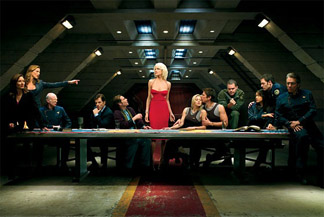Mythology: Buffy-Galactica-Teen Wolf
By Martin Felipe
August 22, 2012
With the Colorado shooting over a month in the rear view mirror, I feel a little more comfortable with the topic I was going to discuss at the time, darker versions of established mythologies. You see, many folks trumpeted Nolan’s Batman as a grittier, more realistic take on the character. Then, of course, came the tragedy, and how it impacted the reception of the conclusion of the Gotham trilogy looks to become a topic of debate for years to come.
Of course, it’s still far too early to determine if bleaker retellings will make way for cheerier adaptations. The new Oz movie is coming soon, and it promises a look at the magical land from a grimmer perspective, one more in keeping with the source novels, and we still have the new Spider-Man series, wherein Peter Parker’s costume is less bright, but one assumes that, whichever direction Hollywood takes Batman next, he’ll probably be a little less dark of a knight.
Alternate interpretations are all well and good, and certainly dark is not intrinsically superior to light, but I do hope that the new storytellers bringing fresh perspective to existing stories do so with inspiration, not trepidation. As I focus these pieces more often than not on TV as opposed to film, let’s take a look at a few shows that relaunched what came before in a darker direction, to both creative success and failure.
I think the poster child for this, as he is with so many of these columns, is Joss Whedon. Yes, I'm talking about Whedon, the man now renowned for having given us the fun superhero movie alternative to The Dark Knight Rises, The Avengers. Way back in the bygone era known as the '90s, a silly looking little film came out called Buffy The Vampire Slayer. Sure enough, the film delivered what it promised, a frivolous blonde cheerleader and her zany vampire killing antics.
The thing is, writer Whedon never intended it to be so light weight, despite his heroine’s preposterous name. He saw it more as an allegory for growing up, not to mention a somewhat feminist take on horror clichés. The studio wanted more of a winking romp. The dissatisfaction Whedon felt is now Hollywood legend. In the wake of the film, Whedon created a TV show far more to his liking.
The show maintains some of the cheek of the movie, but explores the weightier themes that interest Whedon. It became one of the most acclaimed series of its time and maintains a rabid following to this day, even as the movie slips into obscurity.
Now it’s easy for me to slide into some Whedon worship as I often do, so I’ll back off a little from the gush. Bottom line, a light movie set in the Buffyverse could exist. It’s not that the movie’s atmosphere is the issue so much as it is that, for a film promising a flighty romp, it’s really just boring. In this case, the darker version proves to be the superior one.
Continued:
1
2




